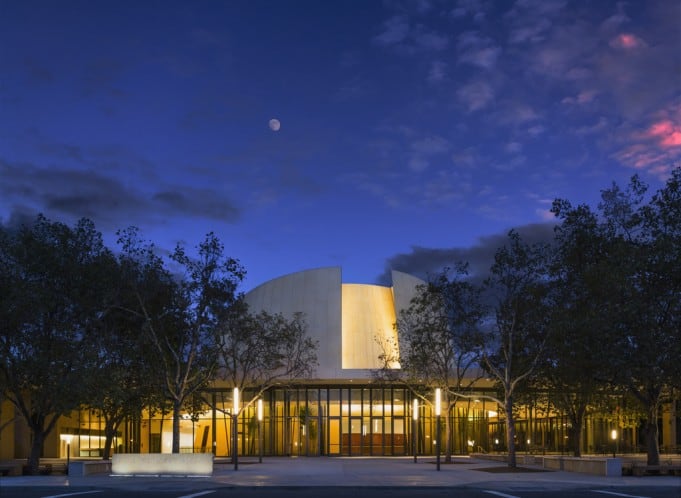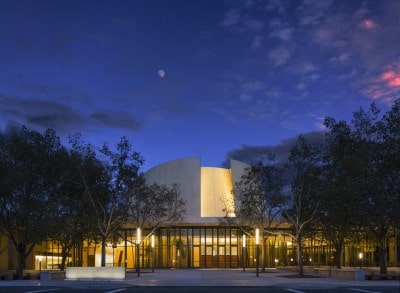Philharmonia Baroque Orchestra
Location: Philharmonia Baroque Orchestra
- Musical Director – Nicolas McGegan
- Bing Concert Hall, Stanford University
Thursday’s Philharmonia Baroque Orchestra concert as much an affirmation of the brand new Bing Concert Hall at Stanford as it was an affirmation of the PBO.
Unless you’ve been under the proverbial bushel basket, you’ve heard the massive hype about the new Bing Concert Hall. The most recent alumni magazine waxed about the auditorium, designed by acoustician Yasuhisa Toyota, whose earlier work includes the New World Center in Miami, Bard College’s Fisher Center for the Performing Arts, and the 2,265-seat Walt Disney Concert Hall. All the preliminary anxieties about this new venue, last minute changes, and the seeming obsession about the floor were given voice in other websites. In the most recent Stanford alumni rag, Wiley Hausam, executive director of the hall, pointed out that even “the floor of the stage is like the sounding board of a cello or a violin, so really the whole auditorium is a musical instrument.”
Such characterizations sound inflated indeed, until you’ve been there. Arriving early, I had a chance to explore a bit. This building, with its curved lines and soft yellow glow, wraps its arms around you even before you enter. Grabbing a glass of wine and bite of cheese in their café and sitting on one of the long benches, strategically curved so as to provide an intimate moment, made me deliciously happy. By comparison, the same act at Davies Symphony Hall makes you feel as if you’re in an airport.
Clear, clean classical sounds lend themselves to this venue.
All of this is a long warm-up for the concert itself. A ticketing snafu had me perched in the highest row, smack dab next to the sound guy, looking down at the top of conductor Nicholas McGegan’s head. Immediately, I saw this as a chance to evaluate the claim that the acoustics of the venue were such that there wasn’t a bad seat in the house.
The first intimation that I was in for something special came even before the concert, when my concentration as gently nudged away from the rearing the program by a lone violinist quietly warming up on stage. I could actually hear this person so far away, playing quietly to herself.
Things only got better from there. Despite having killer seats at most of the regular venues where the PBO performs, I had the startling sense I’d never heard them before – even when ensconced in third row seats at the Menlo Atherton Center for the Performing Arts. Part of this may have been the nature of the program itself. I heard them better than ever before – and entertained the idea that what I was hearing was as equivalent to what conductor Nic McGeegan heard. Clear, clean classical sounds lend themselves to this venue.
SEE: TheatreWorks Silicon Valley announces new season via Twitter
The current concert, including Haydn’s “Trauer” Symphony, two pieces by Johann Christian Bach, and Mozart’s Symphony 2 in A Minor, was unlike anything I’d heard from the PBO before. While a good part of this can be attributed to the wondrous acoustics of the venue, the rest lies in the program. Gone was the basso continuo by the estimable Hanneke van Proosdij, and gone were the recorders, theorbo, and other baroque instrumentation. In their place were the crisp clear strings, every nuance of which was immediately audible, and the wonders of oboeist Marc Shachman and bassoonist Danny Bond. Schactman was stunning, as he alternated between his subtle performance in the Trauer to the full blown glory of Johann Christian Bach’s Sinfonia Concertante for Oboe and Bassoon in F. Major.
Compositions by Johann Christian Bach – who composed half of the entire program – were entirely new to me. Unlike compositions by his father, Johann Sebastian Bach, and unlike his brother, CPE Bach, the music of Johann Christian Bach is restrained, galant, classical – and entirely lacking contrapuntal busyness. I’ll have to spend more time with JC Bach, aka the London Bach.
The PBO will be returning to the Bing Concert Hall (as well as the Herbst and First Congregational in Berkeley) in March for a far more decidedly baroque program, featuring works by Corelli, Vivaldi, Misso, Pergolesi and Locatelli.




